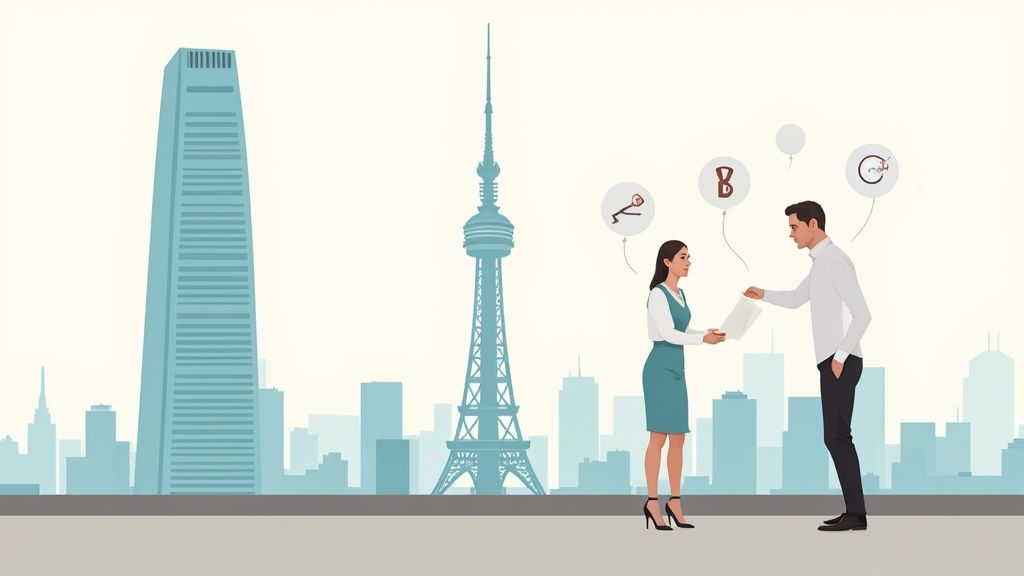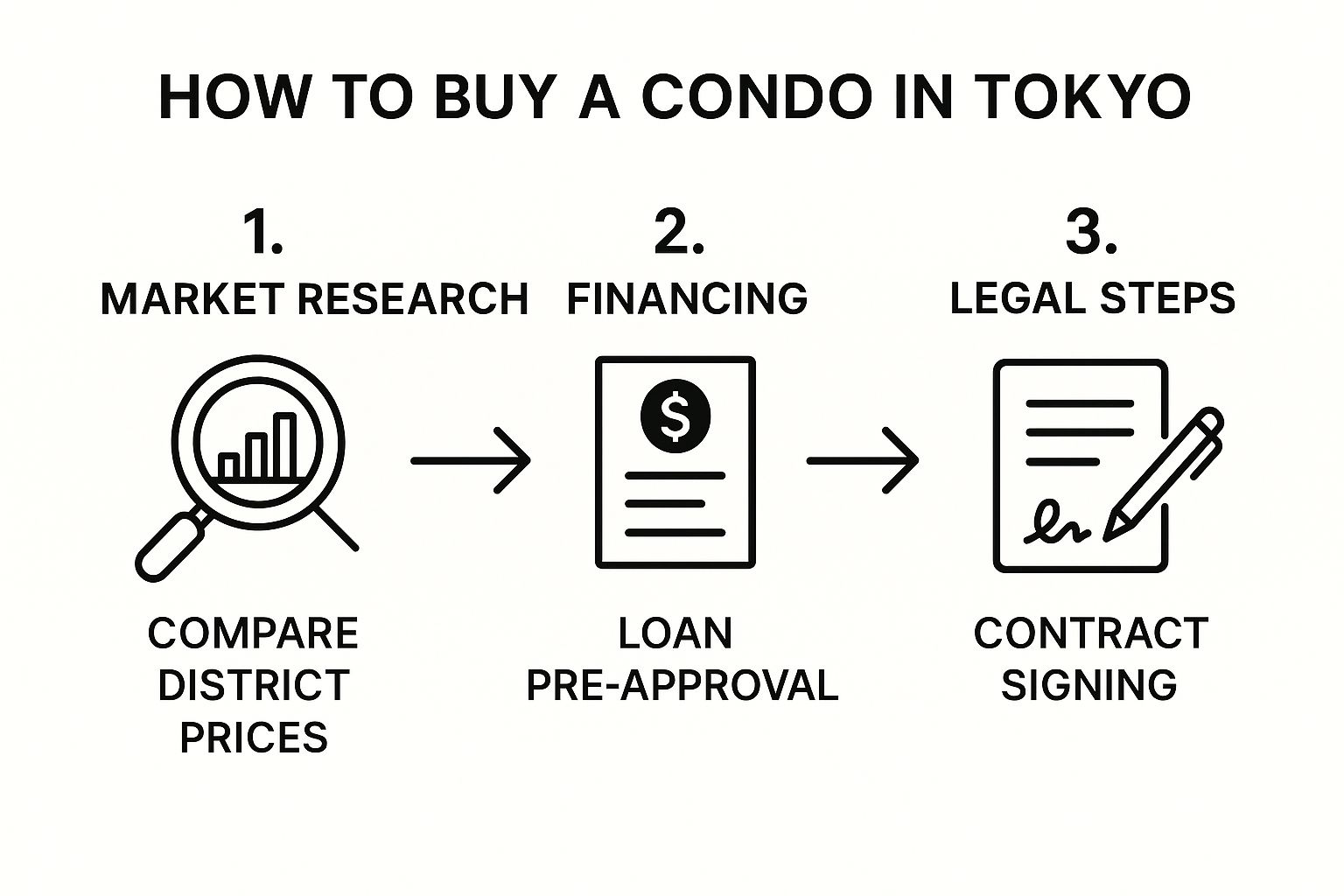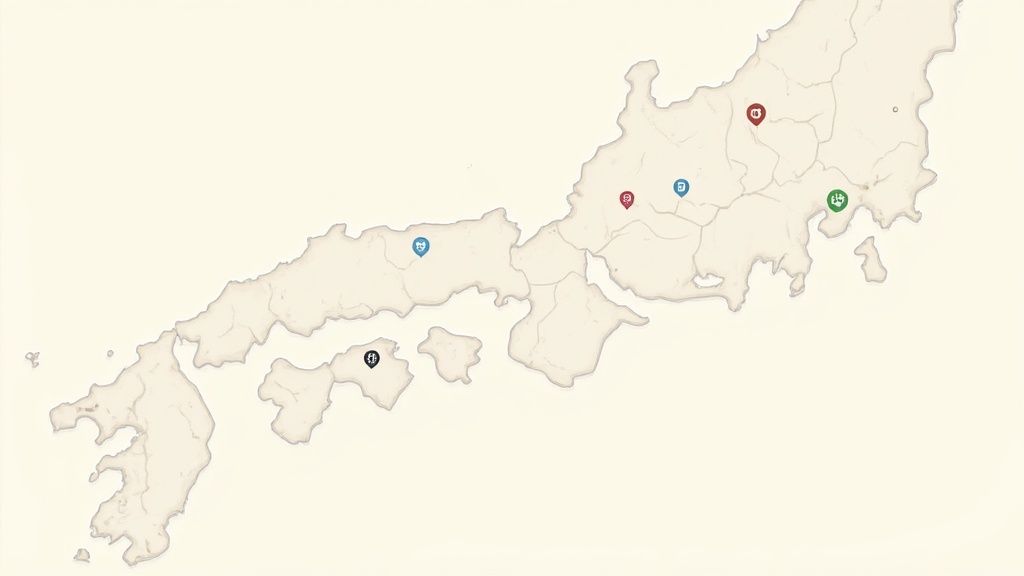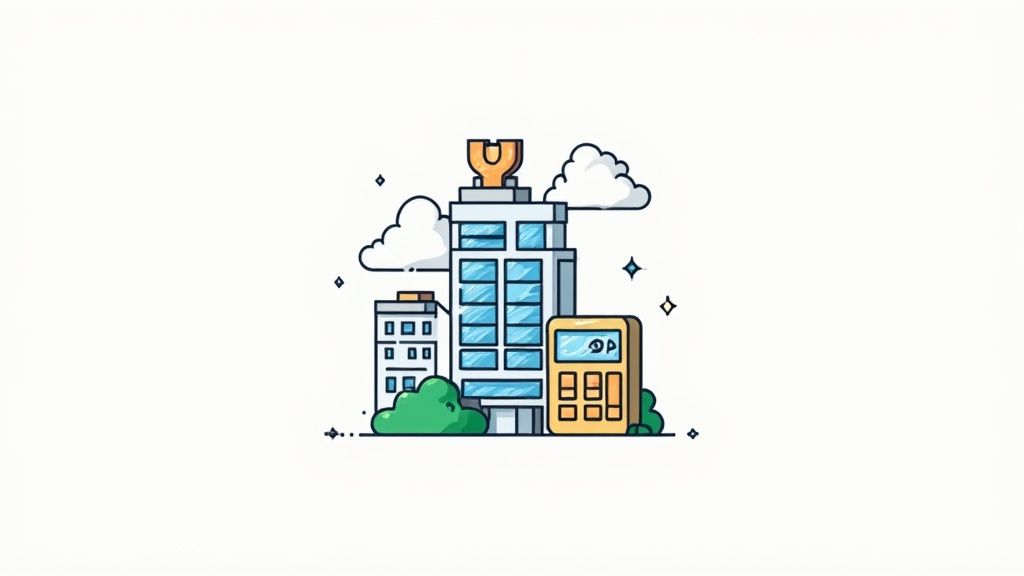Buy Condo in Tokyo: Your Ultimate Guide to a Smooth Purchase
Looking to buy condo in Tokyo? Discover expert tips on financing, finding the best properties, and navigating the legal process with ease. Read more!
Posted by

Thinking about buying a condo in Tokyo? It’s a goal that’s well within reach for foreigners. Japan is one of the few countries that places no restrictions on property ownership based on your nationality or residency status.
The path is pretty straightforward for everyone, whether you're a local or an international buyer. It boils down to getting your financing in order, teaming up with a real estate agent to find the right place, and working through the legal paperwork to close the deal.
Your Roadmap to Buying a Tokyo Condo
Jumping into the Tokyo real estate market is an exciting move. It’s known for being one of the most stable and rewarding markets globally, offering that unique mix of ultra-modern living and rich cultural heritage. This guide is here to walk you through it, making a potentially complicated process feel much more manageable.
One of the first things you'll need to decide is whether you want a brand-new condo—known as 'shinchiku' (新築)—or a pre-owned one, called 'chuko' (中古). Both have their perks. New builds give you the latest amenities and a fresh start, but resale properties often deliver better value, especially in those prime, well-established central neighborhoods.
Understanding the Current Market Dynamics
Tokyo's property scene is constantly shifting. Lately, we've seen a ton of action, especially in the resale market.
For instance, in early 2025, the average price for a pre-owned condo in Tokyo’s 23 wards shot up to around 134.48 million yen. That’s a massive 42.6% increase from the previous year. And it’s not just prices—the number of transactions in March 2025 jumped 31.0% compared to the year before, which tells us demand is still incredibly strong.

The journey from initial research to getting the keys involves several key phases, which this process map helps to visualize.
The key takeaway for any prospective buyer is preparation. Having your finances pre-approved and understanding the market before you start viewing properties gives you a significant advantage in a fast-moving environment.
While this guide zeroes in on condominiums, many of these steps apply to other types of properties too. If you're curious about different options, check out our comprehensive guide on buying a house in Japan as a foreigner for more insights.
To give you a clearer picture, here’s a breakdown of the typical journey.
Key Stages of Buying a Condo in Tokyo
| Stage | Key Activities | Typical Timeline |
|---|---|---|
| Financial Preparation | Assess your budget, gather documents, and get mortgage pre-approval. | 1-2 Months |
| Property Search | Work with a real estate agent, view properties, and narrow down your choices. | 1-3 Months |
| Making an Offer | Submit a purchase application ('moushikomisho') and negotiate terms. | 1-2 Weeks |
| Due Diligence | Agent prepares the 'Explanation of Important Matters' (重要事項説明書). | 1-2 Weeks |
| Signing the Contract | Review and sign the purchase agreement; pay the deposit (5-10%). | 1 Day |
| Finalizing the Loan | Complete the formal mortgage application and secure final approval. | 3-4 Weeks |
| Closing & Handover | Make the final payment, transfer the title, and receive the keys. | 1 Day |
This table outlines the core milestones you can expect. Remember, timelines can vary, but having a solid plan makes all the difference.
Securing Your Finances for a Tokyo Condo
Before you even start dreaming about that perfect Tokyo view from a new condo, we need to talk about money. It's the least exciting part of the process, but getting your finances sorted from the very beginning is, without a doubt, the most critical step. When you set out to buy a condo in Tokyo, the number you see on the listing is just the starting point.
A lot of first-time buyers get caught off guard by the closing costs, which can easily tack on an extra 6-8% to the property's price. This isn't pocket change; it’s a substantial amount of cash you’ll need on top of your down payment.

Breaking Down the Upfront Costs
So, what exactly are these extra expenses? They pop up at different times during the purchase, but you absolutely need to factor them all into your initial budget.
- Real Estate Agent Commission: This is usually the biggest one. Expect to pay 3% of the property price + 60,000 yen, plus consumption tax.
- Stamp Duty: This is a tax you pay on the actual purchase contract. It's not huge, but it's there. For most condos, it falls somewhere between ¥10,000 and ¥60,000, depending on the sale price.
- Registration and License Tax: You have to pay this to officially register your ownership of the property with the government.
- Judicial Scrivener Fees: A legal professional called a shiho shoshi is essential for handling the title transfer and registration paperwork. Their fee covers this vital service.
Getting a handle on these numbers early on is the key to figuring out what you can genuinely afford. For more context on the market itself, our https://www.mapdomo.com/blog/a-guide-to-japan-housing-prices-for-buyers is a great resource.
Getting a Mortgage as a Foreign Resident
Yes, as a foreign resident, you can get a mortgage from a Japanese bank. It's completely possible, but they're going to take a very close look at your situation. Banks are all about stability, and they want to see that you have a solid, long-term connection to Japan.
Here’s what they’ll typically zero in on:
- Visa Status: Having Permanent Resident (PR) status is the golden ticket. It opens up the most options by far. A Spouse Visa or a long-term work visa (like the Highly Skilled Professional visa) also works in your favor.
- Employment History: Lenders are looking for a steady job history in Japan. Having at least 2-3 years under your belt with the same company is a common benchmark they like to see.
- Annual Income: This one's a big deal. Most banks set a minimum income floor, which often starts around the ¥4-5 million mark per year.
Here’s a pro tip: Get a mortgage pre-approval from a bank before you start seriously looking at properties. This is an absolute game-changer. It signals to sellers that you're a serious buyer who can actually close the deal.
Walking into a negotiation with a pre-approval letter in hand gives you a massive advantage. It clearly defines how much you can borrow, so you can stop guessing and start searching for condos that are realistically within your budget. This one small step turns your property hunt from a casual browse into a focused, strategic mission.
Finding Your Ideal Condo in Tokyo
Once you have your budget nailed down and financing pre-approval in hand, it's time for the fun part: the actual property search. This is when your dream of owning a condo in Tokyo starts to feel real, but you'll want to go in with a smart game plan. Your most valuable asset here will be a local real estate agent, or fudosan-ya.
Finding the right agent can make or break your experience. You'll need someone who is not only bilingual but who has a proven track record of helping international buyers. They will be your guide through property viewings—called naiken—and will help you look past the fresh paint and staging to spot the real potential and any hidden red flags.

Decoding Property Listings and Neighborhoods
If you're new to the Japanese market, property listings can look like a secret code. You'll see floor plans labeled with terms like "1LDK," which simply means one bedroom plus a combined living, dining, and kitchen area. Getting a handle on this shorthand is the first step to filtering listings and finding layouts that actually work for you.
Of course, a great floor plan is only half the story. The neighborhood, or machi, is what will shape your day-to-day life in Tokyo. The city is really a collection of villages, each with its own distinct vibe.
- Minato Ward: Think upscale and international. Areas like Azabu and Roppongi are perennial favorites among expats.
- Setagaya Ward: This area has a more relaxed, residential feel. It’s popular with families and creatives who love its trendy cafes and green spaces.
- Shibuya Ward: If you want to live in the heart of the action, with endless energy and excitement, this is the place to be.
A good agent will offer on-the-ground insights into commute times, local schools, and the best grocery stores—all the little things that turn a property into a home. The market here moves fast, so it pays to be ready to act when you find a place you love.
The demand for condos in the greater Tokyo area has been incredibly strong. Just to give you an idea, in April 2025 alone, 3,950 existing condos changed hands across the metropolitan area. That's a 21.5% increase from the same time last year, showing just how much confidence buyers have in the market. If you're a data nerd, you can dig into more market trends over at Patience Realty.
Crucial Due Diligence During Viewings
When you're at a naiken, try to look beyond the surface-level aesthetics. A few critical details will ultimately decide the long-term value and safety of your investment.
Always investigate the building's structural integrity and financial health. A beautiful interior means little if the building itself is on shaky ground—literally or financially.
Make sure you or your agent are asking about these key points:
- Earthquake Resistance: Find out if the building was constructed after June 1981. This is a critical date because properties built after it must comply with the much stricter shin-taishin earthquake resistance standards. For your safety, this should be a non-negotiable.
- Long-Term Repair Fund: You need to see the records for the shuzen tsumitatekin. This is essentially the building's savings account for major repairs down the road, like replacing the roof or elevators. A healthy fund means the building is well-managed and you're less likely to be hit with a surprise special assessment fee.
- Building Management: Who manages the building? Is the homeowners' association active and organized? A proactive management team keeps the property in top shape, which is crucial for protecting its value over time.
By focusing on these fundamentals, you can distinguish a true gem from a property that just looks good on the surface. This is the kind of careful diligence that separates a good purchase from a great one, ensuring your new Tokyo condo is a sound investment for years to come.
Making an Offer and Navigating the Paperwork
So, you’ve found it—the one. The view is perfect, the location is unbeatable, and you can already picture your life there. The thrill of the hunt is over, but now comes the equally critical part: locking it down. This is where you’ll navigate the very structured, and often unfamiliar, world of Japanese real estate paperwork.
It all starts with getting your foot in the door, formally. In Japan, you don't just call up an agent and say, "I'll take it." Instead, you submit a 'kaiuke shomeisho' (買付証明書), which is essentially a Letter of Intent to Purchase. Think of this as your official application. It’s not legally binding, but it tells the seller you’re serious and lays out your offer price, proposed closing date, and any other conditions. This is what gets the ball rolling.

The Explanation of Important Matters
Once the seller accepts your offer, you’ll move into what is arguably the most important meeting of the entire process: the 'juuyou jikou setsumei' (重要事項説明). This translates to the "Explanation of Important Matters," and it's a non-negotiable step mandated by law.
This isn’t a quick skim-and-sign affair. A licensed real estate professional will sit down with you and read through an exhaustive document, page by page. They’ll cover everything from obscure zoning laws and building codes to the financial health of the building's maintenance fund and any known issues with the unit or the land. Your agent is your lifeline here, translating and clarifying every single point.
This meeting is your last, best chance to do your homework. There are no stupid questions. If something feels unclear, ask. And then ask again. Getting everything straight now prevents major headaches down the road.
This rigorous disclosure process is a hallmark of Japanese real estate. It’s designed to give you complete transparency before you’re locked into a contract.
Signing the Purchase Agreement
Right after the Explanation of Important Matters wraps up and you’ve given the green light, it’s time to sign the final purchase agreement. This happens in the very same meeting, making it a legally binding moment.
To get this done, you'll need two things ready to go:
- Your Personal Seal ('hanko' or 'inkan'): If you’re a resident, you’ll use your registered seal to make the contract official. For non-residents, a signature affidavit notarized at your home country's embassy is usually the accepted alternative.
- The Earnest Money Deposit ('tetsukekin'): This is a serious commitment. You'll hand over a deposit of 5-10% of the purchase price, typically in cash or via a bank transfer. This payment seals the deal.
Here’s a key difference from many Western practices: this deposit goes directly to the seller, not into a third-party escrow account. It’s a standard procedure here, rooted in a high-trust business environment. Don't worry, this payment is credited toward your final purchase price at closing. Understanding these steps is a huge part of feeling confident when you buy a condo in Tokyo, transforming a potentially confusing process into a clear path to ownership.
Closing the Deal and Getting Your Keys
You’re in the home stretch, and the excitement is probably palpable. This is it—the final step in your journey to buy a condo in Tokyo. Closing day is a formal affair, but it's also the moment everything becomes real. All that planning and paperwork finally culminates in you getting the keys to your new home.
The closing itself usually happens at the seller's bank. You'll be there with your agent, the seller, and a critical legal professional called a 'shiho shoshi' (司法書士), which translates to judicial scrivener. Their job is absolutely essential. They’re the ones who meticulously verify everyone’s identity and all the documents before officially transferring the property title into your name.
This meeting is also where the final money changes hands. You'll transfer the remaining balance of the purchase price directly to the seller's account. As soon as the seller confirms the funds have arrived, the 'shiho shoshi' heads straight to the Legal Affairs Bureau to register your ownership. It’s a very efficient, well-oiled process.
What to Expect on Closing Day
Closing day is a well-orchestrated event, and your agent will be right there to walk you through it. But it definitely helps to know the flow beforehand.
- Document Check: The 'shiho shoshi' will pore over every last piece of paperwork, including your residence certificate and personal seal certificate. No detail is too small.
- Final Payment: This is the big one. It's handled right there at the bank to ensure everything is secure and transparent.
- Title Registration: The 'shiho shoshi' physically takes your documents to be registered, which is what legally protects your ownership rights.
- The Handover: Once the money is confirmed, the seller hands over all the keys. Just like that, the condo is officially yours.
It's worth remembering that while the new condominium market can see some wild price swings, the resale market often offers more stable, predictable growth. That stability is exactly why so many buyers, especially experienced ones, feel confident investing in Tokyo's resale condo market.
For a real-world example, just look at the resale condominium market in Tokyo's 23 wards. It has shown incredible strength, with prices climbing for nine straight months into April 2025. In central Tokyo, the year-over-year price increase for resale condos even hit an astonishing 28.3%, proving just how resilient this segment of the market is. You can dig deeper into Japanese property market trends to see the data for yourself.
Life After Getting the Keys
Congratulations, you're officially a Tokyo condo owner! But before you pop the champagne, there are a few loose ends to tie up. Taking care of these small tasks right away makes the transition into your new life much smoother.
Your agent can usually point you in the right direction for these final steps:
- Get Utilities Running: You’ll need to set up your electricity, gas, and water. This is usually pretty painless and can often be done online or with a quick phone call.
- Learn the Building Rules: Take some time to get familiar with the homeowner association's (HOA) rules. You'll want to know the policies on things like renovations, pets, and even the garbage disposal schedule, which can be surprisingly specific in Japan.
- Budget for Annual Taxes: Don't get caught off guard by the annual fixed asset tax and city planning tax. Your 'shiho shoshi' should have given you an estimate, so make sure you factor this recurring expense into your budget.
Getting these things sorted out quickly means you can stop dealing with logistics and start truly enjoying your new home.
Your Top Questions About Buying a Tokyo Condo
Diving into the Tokyo condo market, especially as a foreigner, naturally brings up a lot of questions. Getting straight answers is the first step toward making a confident move. Let's walk through some of the most common things people ask when they start this journey.
The first question is always the big one: "Can I, as a foreigner, actually buy property in Japan?"
The answer is a simple, resounding yes. Japan has no laws restricting property ownership based on your nationality or where you live. The real challenge for non-residents is getting a mortgage from a Japanese bank, which is incredibly difficult without a local income stream and a residence visa. Because of this, most overseas buyers either pay in cash or secure financing from a bank in their home country.
Getting the Terminology and Costs Straight
Once you know you can buy, the conversation quickly turns to the properties themselves. You’ll hear Japanese real estate agents throw around terms like ‘mansion’ and ‘apaato,’ and it’s important to know they aren't what they sound like in English.
In Japan, a ‘mansion’ (マンション) is a condominium. These are solid buildings made from reinforced concrete or steel frames, built for the long haul. On the other hand, an ‘apaato’ (アパート) is usually a smaller apartment in a two-story building made from wood or light-gauge steel. If you’re looking to buy a proper condo in Tokyo, you’re looking for a ‘mansion.’
Understanding the full cost is just as important as knowing the terminology. The price on the listing is just the starting point.
One of the biggest mistakes I see buyers make is not budgeting for closing costs. A good rule of thumb is to set aside an extra 6-8% of the property’s price. This will save you from any nasty financial surprises right before you get the keys.
This extra amount covers a handful of necessary expenses:
- Agent Commission: The standard formula is 3% of the purchase price + ¥60,000, plus consumption tax.
- Taxes: You'll pay stamp duty on the contract, along with registration and license taxes to get the title in your name.
- Professional Fees: A judicial scrivener handles the legal registration of your ownership, and they have a fee for this service.
- Ongoing Costs: Remember to factor in annual fixed asset taxes and the monthly building management and repair fund fees that come with condo ownership.
Safety First: The Non-Negotiable Due Diligence
Finally, let's talk about safety—specifically, earthquake resistance. This isn't just a box to tick; it's arguably the most critical part of your due diligence in Japan.
Your search should focus on buildings constructed after June 1981. This is the date the government implemented the much stricter ‘shin-taishin’ (new earthquake resistance) building codes. Buildings that meet these standards are designed to withstand a major quake without collapsing, which is essential for your safety, your peace of mind, and the future value of your investment.
For a more detailed checklist, our guide on the questions to ask before buying a home in Japan breaks down everything you need to verify.
Ready to start your property search? At mapdomo, we make discovering your ideal Japanese home simple. Explore thousands of listings, from modern Tokyo condos to traditional countryside houses, all on one interactive platform. Begin your search on mapdomo.com today.